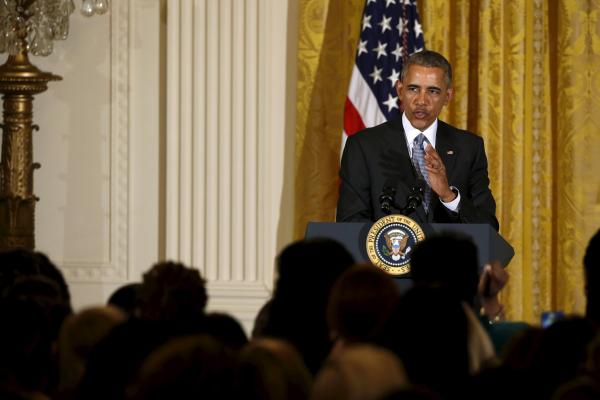
U.S. President Barack Obama delivers remarks at a Women’s History Month reception at the White House in Washington March 16, 2016. REUTERS/Jonathan Ernst
Barack Obama got more confused with his interview with “The Atlantic” magazine.
How and why did his doctrine change in seven years?
The truth is that Barack Obama is the only US President who has gained the love of Arabs and Muslims in their most difficult times. His term started with friendly relations with our region that we were unfamiliar with. He delivered two speeches from two of the most important historical Muslim cities, Cairo and Istanbul.
His speech at Cairo University was a magnificent piece of literature in which he spoke about his vision of Islam and peace, his experience in Jakarta, and his partially African and Muslim descent. Thus, he gained the love of many among the 300 million Arabs who are usually displeased with the United States’ actions. Obama, the 44th US president, was undoubtedly the first to win Muslims’ hearts.
His biggest mistake was his position on the Syrian crisis. No one understood why the president of the most powerful country in the world refused to help the people of whom half a million have been slaughtered. In his interview with “The Atlantic” magazine, we feel that Obama has probably changed a lot of his views.
In this interview, coldness, frustration and remoteness replaced the kindheartedness and enthusiasm Obama showed when he first became president.
Obama’s angry statements did not exclude any of his allies, including Saudi Arabia. Many of Riyadh’s rivals celebrated his criticism for the kingdom, which has the longest stable relationship with the United States in the region. Yet, despite his negative views, he did not allude to any change in his policy, at least in my reading for the subject.
The coincidence of publishing his interview before his visit to Saudi Arabia with Joe Biden and John Kerry, does not deliver any message. Obama’s talks with Jeffrey Goldberg have taken months and the date of publishing cannot be specified, given that “The Atlantic” is a monthly magazine and not a daily newspaper.
Nevertheless, these facts do not reduce the damage caused by the thoughts and feelings Obama revealed during the interview.
The interview proves that Obama has “developed” his understanding of extremism and terrorism as his opinions now totally oppose his statement at Cairo University.
Back then, he proposed cooperation to fight extremism. While he is now blaming Saudi Arabia and cooperating with Iran, the country that, in his opinion, has good traits his predecessors could not figure out.
Extremism is neither a state nor a religion, but a general phenomenon. Therefore, blaming others and making accusations do not eliminate it. Extremism is a serious ideological virus that has spread in Muslim societies, including those in the West. Obama said that he spent a part of his life in Indonesia, where the majority of citizens were tolerant Muslims, but when he visited it later he was saddened by extremism, which in his opinion was due to Saudi intellect.
Extremism in modern Islam is complicated. It appeared in the early 1980s in Saudi Arabia and its surroundings, but this coincided with the extremist 1979 revolution in Iran and the launching of a war against the Soviets in Afghanistan in the name of Islam with Saudi-US-Pakistani partnership. Religion was politicized at that period of time, yet before then I did not know or hear of any mosque in my city Riyadh that preached about politics. All preaches, however, were on morals and acts of worship.
Clerics did not appear on TV to discuss world affairs. There were no charities or youth camps run by people with certain religious or other affiliations. What was common back then was the traditional Saudi Salafi Sunni concept, which was well-known for being conservative regarding social affairs, but left politics to relevant figures.
The Iranian revolution and the subsequent adoption of violent jihad in conflicts led to extremism as we see it today.
The new Iranian rulers were the first to use religion in managing foreign affairs. Thus, when Obama complains of extremism that reached Jakarta, we too complain of it in Riyadh, Cairo and Casablanca.
Riyadh was not like that. I lived there during the same period when Obama lived in Jakarta.
Obama’s analysis was logical and reasonable, but he was mistaken when he talked about a religiously, historically, politically, economically and technically complicated matter and pointed out to only one country and one group.
